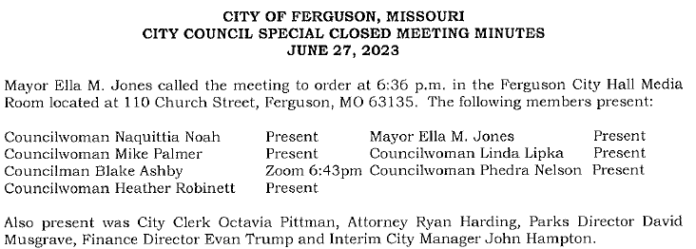In a recent council meeting, the city announced that it would not be publishing closed session minutes, but that interested residents could pay for a sunshine request if they wanted to see them. Councilors Palmer and Robinett indicated that they supported publishing the minutes. Councilor Ashby spoke out against publishing them, indicating that “it’s not like council does anything in secret anyway.” Our review of minutes produced in response to our sunshine request tell a different story.
Of course, the very purpose of a closed session is to “do things in secret.” And in some cases, that is appropriate. If you are negotiating a contract, for example, or dealing with sensitive legal issues. As it happens, state law specifies precisely those situations in which a closed session is authorized, and also requires the disclosure of certain information from some closed sessions. The city has taken great liberty with these requirements.
Most seriously, council has held closed sessions on matters for which closed sessions are not authorized. On June 27, a closed session was held for “personnel matters.” A closed session is only authorized for “hiring, firing, disciplining or promoting of particular employees by a public governmental body when personal information about the employee is discussed or recorded.” None of the matters considered in this meeting fell into this exception, and were therefore required to be addressed in public meetings.

In 13 of the 19 meetings for which we received minutes, “personnel matters” is specified as the reason for the closed meeting. Yet in most cases, the minutes contain no information about the outcome of the meeting, or even the subject. In one case, they report a vote to “accept the written reprimand” but do not specify who was reprimanded. In most other cases, they simply report nothing at all. And in at least one case of which we have been made aware, a vote was taken, and was not included in the minutes. State law specifies that “any vote on a final decision, when taken by a public governmental body, to hire, fire, promote or discipline an employee of a public governmental body shall be made available with a record of how each member voted to the public within seventy-two hours of the close of the meeting where such action occurs; provided, however, that any employee so affected shall be entitled to prompt notice of such decision during the seventy-two-hour period before such decision is made available to the public.”
Closed sessions were properly held to consider sealed bids. However, the minutes fail to specify what the bids are for. State law requires that details on the sealed bids become public once the bids are opened. But we have no way of knowing whether that happened, because the closed session minutes are deficient.
In a September closed session, council voted to “instruct the city manager to market the property at 10607 Halls Ferry Road for sale or lease with a commercial brokerage firm for a marketing budget not to exceed $1,000.” The sunshine law allows for closed sessions for “Leasing, purchase or sale of real estate by a public governmental body where public knowledge of the transaction might adversely affect the legal consideration therefor.” This clearly does not fall into that exception, which is crafted to allow the consideration of the particulars of a real estate deal without exposing the city’s negotiating position to a potential buyer. The decision to market a city owned property is not appropriate for closed session.
Finally, and most important, there is the matter of the city’s decision not to offer closed session minutes for public access. To be clear, the minutes are public. The city is simply saying that if you want to see them, you have to pay. And their charges are arbitrary and unreasonable. We placed a sunshine request for all closed session minutes for 2023. This yielded 19 pages of documents, which the city was required to have produced after each session, and they charged nearly $40. Minutes should be published in the city’s agenda center, just like they are for open meetings. And in fact, they did that for a few weeks, until they changed their mind, removed the ones they had published, and ceased the practice. The city claimed that the $39.25 charge was for 70 minutes of “research time.” But since the closed session minutes were already produced, satisfying this request should have required nothing more than going to a folder on the city clerk’s computer, selecting the appropriate files, and uploading them to the city’s portal. It’s difficult to imagine how that could take 70 minutes.
It is hard for us to imagine why the city would have a policy of not publishing these minutes. They are public information, and should be made available to the public in the most timely and accessible way possible. The city’s agenda center exists for this very purpose, and was briefly used for it. The only effect of the city’s refusal is that we will have to pay for the minutes, and will face delays in obtaining them which far exceed the requirements of state law. The city won’t get to keep them secret, because we will publish them all. Our first installment follows this article. Enjoy!
2023-closed-session